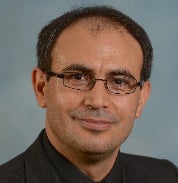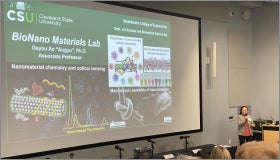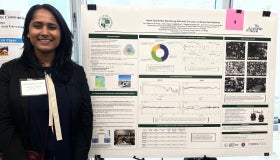
April 2023 |

L-R: Ph.D. students Anita Dhara, Sarah Adams, and Rachael White, Dr. Merlin Nithya Gnanapragasam, and collaborators Dr. Mahesh Ramamoorthy and Dr. Peng Jiang
Red blood cells comprise 80% of cells in the body, and hemoglobin, the oxygen carrying component, constitutes 95% of the protein content in these cells. When red blood cells and hemoglobin don't function properly, an individual's health can suffer greatly.
Merlin Nithya Gnanapragasam, Ph.D., an assistant professor in the Department of Biological, Geological and Environmental Sciences (BGES) and member of the Center for Gene Regulation in Health and Disease (GRHD), has focused her research on understanding the mechanisms of mammalian erythropoiesis (red blood cell production) in development and disease.
Dr. Gnanapragasam has just been awarded a new NIDDK/NIH R01 grant providing $2,063,848 in funding over five years to advance her lab's research. This funding will support investigations on hemoglobin switching and erythroid differentiation. Read More »
|
Tianyun Zhang to Study Edge Computing with New NSF Award Dr. Tianyun Zhang, an assistant professor in the Department of Electrical Engineering and Computer Science (EECS), has been awarded a two year, $174,233 grant from the National Science Foundation (NSF) for research on Edge Computing. Edge Computing involves distributed computing with localized calculations and decision making, as opposed to centralizing data storage and computation in the cloud. Cloud-based computing can result in a lag while data is uploaded, processed, and then communicated back. Read More » |
 |
![]()
|
Dr. Ali Rownaghi is an associate professor in the Department of Chemistry. The primary focus of his Chemical Reaction and Separation Laboratory is on creating, understanding, and rationally engineering advanced nanoporous materials and processes for energy and environmental applications through innovative and scalable processing strategies. He is currently leading an NSF funded grant titled “Morphology-Controlled Carbon Molecular Sieve Membranes for Gas Separation” that is focused on developing a controlled fabrication process for gas separation membranes that overcomes the primary limitations facing industrial use of membranes in energy-intensive gas separation. Read More » |
 |
![]()
|
IBM deployed The IBM Quantum System One—the first on-premises quantum computer in United States—on Monday, March 20 at the Cleveland Clinic. It’s the first quantum computer in the world to be uniquely dedicated to healthcare research. CSU is one of three “Founding Quantum Members” in the region (joining Case Western Reserve University and Kent State University) participating in the joint research and education across disciplines on campus and also with the Clinic. Read More » |
 |
![]()
|
Kailash Gulshan's Lab Team Publishes Two New Journal Articles in iScience Dr. Kailash Gulshan, an assistant professor in the Department of Biology, Geology, and Environmental Science (BGES) and a member of the Center for Gene Regulation in Health and Disease (GRHD), and his team (pictured right) published two papers in iScience, a high impact journal from Cell Press. Dr. Gulshan's laboratory studies a protein called Gasdermin D (GsdmD), which forms pores in cellular membrane to release inflammatory molecules from macrophages and other immune cells. Read More » |
 |
![]()

Innovation Day was a tremendous success with over 200 attendees. CSU was well represented by faculty member presenters Drs. Augyu Ao and Eric Schearer as well as 10 student poster presentations. The inaugural event demonstrated leading-edge innovations, workforce development challenges and access to additional funding mechanisms in Northeast Ohio’s innovation ecosystems. It was organized jointly by Northeast Ohio Public Universities and sponsored by industry partners. Click here to see more photos from Innovation Day 2023.  |

There are many types of funding available to entrepreneurs, but finding the right seed funding for your business can be difficult. GLIDE can help you decide what funding source is best for you and then navigate you through the application process. GLIDE administers the Innovation Fund, Northeast Ohio's pre-seed fund founded by the Lorain County Community College Foundation that supports technology-based entrepreneurial companies. It awards early-stage capital to business in Northeast Ohio, filling the gap between friends and family funding and angel or venture capital funding. The Innovation Fund has two levels of funding:
Learn more about the Innovation Fund or Request an appointment with GLIDE. |
![]()
- The Cleveland State University Department of Theatre and Dance opens the final show of the 2022-2023 season with By The Way, Meet Vera Stark
- Faculty and students share their research and insights in the College of Health's inaugural Research Symposium
- Reminder: Updated guidance from CSU's Institutional Biosafety Committee regarding exempt vs non-exempt experiments involving E. coli, yeast, mouse, and tissue culture cells
- 2023-2024 Faculty Research and Development (FRD) Awards Announced
- 2023-2024 Faculty Scholarship Initiative (FSI) Awards Announced
- 2023-2024 Graduate Student Research Award (GSRA) Awards Announced
- Cleveland State Police Department (CSUPD) and the Counseling Center awarded grant to improve assistance to students who are experiencing a mental health crisis
- Former Director of CSU's Center for Housing Research and Policy Thomas Bier's new book The Way We Are: 100 Plain Dealer Op-Eds published on Engaged Scholarship

|
© 2023 - Cleveland State University - Office of Research |